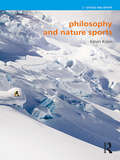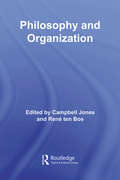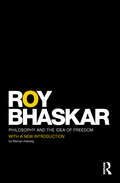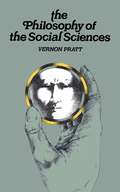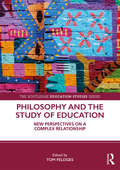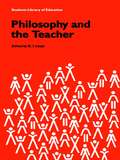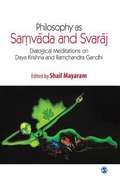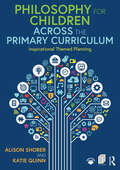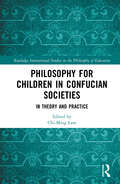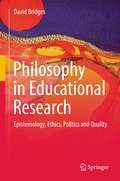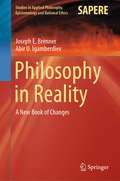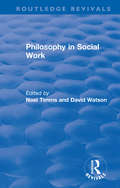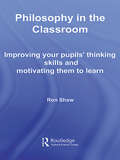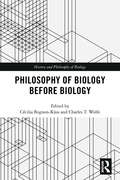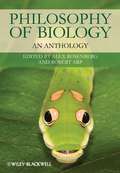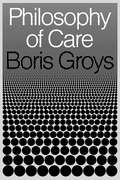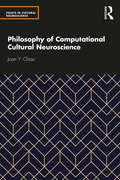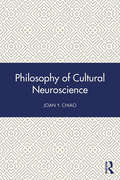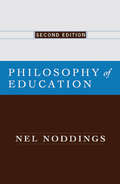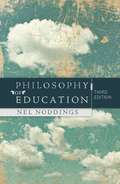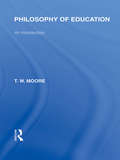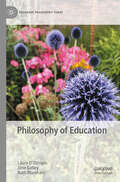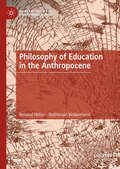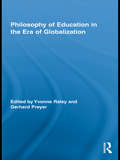- Table View
- List View
Philosophy and Nature Sports (Ethics and Sport)
by Kevin KreinNature sports such as skiing, climbing, and surfing have had a significant influence on Western popular culture since the mid-twentieth century and participation in such sports continues to grow. Written in a clear and accessible style, this important book provides a comprehensive philosophical analysis of nature sports. Philosophy and Nature Sports offers an engaging inquiry into how nature sports differ from mainstream sports, how these differences are related to their value as human activities, and the role of the environments in which such sports take place. Addressing the claim that the most distinctive feature of nature sports is the relationship between participants and the natural world, the book also examines a wide range of topics, such as ethics, risk, gender construction, the social role of nature sport subcultures and the aesthetic experiences of nature sports athletes. Tying these together is the question of what it is that attracts us to nature sports and why they hold meaning for us. This is a valuable resource for students and academics in fields such as alternative sports, alternative sport subcultures, sport philosophy, sport and social issues, ethics, and phenomenology. It is also a fascinating read for outdoor educators and practitioners.
Philosophy and Organization
by Campbell Jones René Ten BosFeaturing original contributions from some of the most exciting scholars writing at the intersection of philosophy and organization today, this accessible volume provides readers with a complete overview of this complex subject. Ground-breaking and drawing on recent efforts in management and organization studies to take philosophy seriously, it critically engages with the way that philosophy might inform organization and illuminates a range of issues, including idleness, aesthetics, singularity, transparency, power and cruelty. Exploring why philosophy matters to organization and why organization matters to philosophy, this book is essential reading for philosophy and business and management students as well as of interest to all those who seek to think seriously about the way their lives are organized.
Philosophy and the Idea of Freedom (Classical Texts in Critical Realism (Routledge Critical Realism))
by Roy BhaskarFirst published in 2011. Routledge is an imprint of Taylor & Francis, an informa company.
Philosophy and the Social Sciences
by Vernon PrattPublished in the year 2004, Philosophy and the Social Sciences is a valuable contribution to the field of Sociology.
Philosophy and the Study of Education: New Perspectives on a Complex Relationship (The Routledge Education Studies Series)
by Tom FeldgesCombining contributions from international academics and practitioners, this new text develops students’ ability to philosophise as well as learn about philosophy and education. It considers issues concerned with the interface between education and wider society but goes beyond this to explore education and philosophy at a micro level: the teacher–learner relationship. It challenges and empowers students to use philosophy as a tool within education, as a set of theories to understand education and as a potential means to develop solutions to problems as they occur within practice. Assuming no pre-existing philosophical background, Philosophy and the Study of Education explores complex topics including: encouraging young people to criticise and challenge all authority; the limits of a religious-based education; the desire for ‘alternative facts’ or ‘truths’; the second-class status of vocational pursuits; the inherent struggle in the teacher–student relationship; the relationship between emotion, morality and autonomy in teaching. Including discussion questions and further recommended reading, this thought-providing book will support and inspire all those on Education Studies, Childhood Studies and Youth Studies courses in developing a critical perspective and understanding the true value of philosophy within education.
Philosophy and the Teacher (Students Library Of Education Ser.)
by D. I. LloydFirst published in 1976. Routledge is an imprint of Taylor & Francis, an informa company.
Philosophy as Samvada and Svaraj
by Professor Shail MayaramPhilosophy as Samvada and Svaraj discusses Daya Krishna and Ramchandra Gandhi's respective intellectual contributions and speculates how one might take forward the work of the two persons who were among the most brilliant minds of our times. Both Daya Krishna and Ramchandra Gandhi emphasized freedom and autonomy of thought and upheld the importance of samvada, somewhat inadequate in its English translation as dialogue. And both of them were philosophers concerned with how philosophy might seek its svaraj, free from the orientalist hold of the religious, the colonial crippling of indigenous languages and institutions and the structures and categories of un-freedom that continue to haunt inhabitants of West and non-West. Philosophy must involve samvada--an open dialogue and intimate encounter between self and other. Both philosophers experimented with these concepts and were enormously creative. This book is a testament not only to the core values of philosophy, but also to how these values can be carried forward by new weaves of tradition and modernity.
Philosophy for Children Across the Primary Curriculum: Inspirational Themed Planning
by Katie Quinn Alison ShorerThis is an easy-to-use, theme-based resource book for Philosophy for Children (P4C) practitioners in primary school settings. It covers ten popular themes which include many current affair issues and enduring curriculum themes such as artificial intelligence, biodiversity, resilience, and waste. Each theme provides planning for every subject and links to the relevant English national curriculum expectations. Offering ideas for a year’s worth of work, it can be dipped into for inspiration or used for step-by-step sessions. There are links to video clips, websites, and stories that teachers and practitioners can use to base their concept exploration and enquires on. Presenting a range of philosophical ideas, activities, and resources, this book is essential for all primary P4C facilitators excited by embedding and exploring philosophy across the curriculum.
Philosophy for Children Across the Primary Curriculum: Inspirational Themed Planning
by Katie Quinn Alison ShorerThis is an easy-to-use, theme-based resource book for Philosophy for Children (P4C) practitioners in primary school settings. It covers ten popular themes which include many current affair issues and enduring curriculum themes such as artificial intelligence, biodiversity, resilience, and waste.Each theme provides planning for every subject and links to the relevant English national curriculum expectations. Offering ideas for a year’s worth of work, it can be dipped into for inspiration or used for step-by-step sessions. There are links to video clips, websites, and stories that teachers and practitioners can use to base their concept exploration and enquires on.Presenting a range of philosophical ideas, activities, and resources, this book is essential for all primary P4C facilitators excited by embedding and exploring philosophy across the curriculum.
Philosophy for Children in Confucian Societies: In Theory and Practice (Routledge International Studies in the Philosophy of Education)
by Chi-Ming LamThis book contributes to the theory and practice of Philosophy for Children (P4C), with a special emphasis on theoretical and practical issues confronting researchers and practitioners working in contexts that are strongly influenced by Confucian values and norms. It includes writings by prominent P4C scholars from four Confucian societies, viz., Mainland China, Hong Kong, Taiwan, and Japan. These writings showcase the diversity of the P4C model, providing a platform for researchers and practitioners to tell their stories in their own Confucian cultural contexts. The research stories in the first part of the book are concerned with assessing the impact of traditional Confucian norms, promoting critical thinking, reconstructing the notion of community of inquiry, creating moral winds, integrating philosophy into the school curriculum, and localizing teaching methods and materials. Four issues are discussed in the second part of the book: the tension between Confucianism and powerful thinking; cultural challenges for practitioners; the transformation of harmony; and the conception of family. Taken as a whole, the book provides fresh insights into whether and how P4C’s Westerninfluenced theories and practices are compromised when they are applied in non-Western, or rather Confucian, contexts. A must-read for anyone interested in the theory and practice of P4C and Confucianism in general.
Philosophy in Educational Research
by David BridgesThis book provides critical and reflective discussions of a wide range of issues arising in education at the interface between philosophy, research, policy and practice. It addresses epistemological questions about the intellectual resources that underpin educational research, explores the relationship between philosophy and educational research, and examines debates about truth and truthfulness in educational research. Furthermore, it looks at issues to do with the relationship between research, practice and policy, and discusses questions about ethics and educational research. Finally, the book delves into the deeply contested area of research quality assessment. The book is based on extensive engagement in empirically based educational research projects and in the institutional and professional management of research, as well as in philosophical work. It clarifies what is at stake in international debates around educational research and teases out the nature of the arguments, and, where argument permits, the conclusions to which these point. The book discusses these familiar themes using less predictable sources and points of reference, such as: codes of social obligation in contemporary Egypt and New Zealand; the 'Soviet', and the inspiration of the nineteenth-century philosopher, Abai in contemporary Kazakhstan; seventeenth-century France, Pascal, and the disputes between Jesuits and Jansenites; eighteenth-century Italy, Giambattista Vico, and la scienzia nuova; 'educational magic' in traditional Ethiopia; and ends at a banquet with Socrates and dinner with wine and a conversation-loving Montaigne.
Philosophy in Reality: A New Book of Changes (Studies in Applied Philosophy, Epistemology and Rational Ethics #60)
by Abir U. Igamberdiev Joseph E. BrennerPhilosophy in Reality offers a new vision of the relation between science and philosophy in the framework of a non-propositional logic of real processes, grounded in the physics of the real world. This logical system is based on the work of the Franco-Romanian thinker Stéphane Lupasco (1900-1988), previously presented by Joseph Brenner in the book Logic in Reality (Springer, 2008). The present book was inspired in part by the ancient Chinese Book of Changes (I Ching) and its scientific-philosophical discussion of change. The emphasis in Philosophy in Reality is on the recovery of dialectics and semantics from reductionist applications and their incorporation into a new synthetic paradigm for knowledge. Through an original re-interpretation of both classical and modern Western thought, this book addresses philosophical issues in scientific fields as well as long-standing conceptual problems such as the origin, nature and role of meaning, the unity of knowledge and the origin of morality. In a rigorous transdisciplinary manner, it discusses foundational and current issues in the physical sciences - mathematics, information, communication and systems theory and their implications for philosophy. The same framework is applied to problems of the origins of society, the transformation of reality by human subjects, and the emergence of a global, sustainable information society. In summary, Philosophy in Reality provides a wealth of new perspectives and references, supporting research by both philosophers and physical and social scientists concerned with the many facets of reality.
Philosophy in Social Work (Routledge Revivals: Noel Timms #2)
by Noel Timms, David WatsonOriginally published in 1978, Philosophy in Social Work is a collection of papers that invites reflective consideration of the philosophical issues arising out of social work. The work stemmed from a series of meetings at the University of Glasgow, designed to encourage philosophers to look at traditional problems raised in the comparatively unfamiliar setting of social work and social service, and for social workers to see the place for philosophical reflection on what they are doing. Among the subjects discussed in the collection are discretion, rights, charity and the Welfare State, the morality of law and the politics of probation, authority and the social workers, and social work and ideology. The underlying theme of all the papers is the away in which philosophy can revive discussion of beliefs and values in social work. It also asks philosophers to intensify their treatment of concrete issues of social significance.
Philosophy in the Classroom: Improving your Pupils' Thinking Skills and Motivating Them to Learn
by Ron ShawEver had difficulty inspiring your children to consider and discuss philosophical concepts? Philosophy in the Classroom helps teachers tap in to children’s natural wonder and curiosity. The practical lesson plans, built around Aesop’s fables, encourage children to formulate and express their own points of view, enabling you to lead rich and rewarding philosophical discussions in the primary classroom. This highly practical and engaging classroom companion: prompts students to consider serious moral issues in an imaginative and stimulating way uses Aesop's fables as a springboard to pose challenging questions about the issues raised provides fifteen key themes including happiness, wisdom, self-reliance and judging others as the basis for classroom discussion. uses powerful and creative drawings to illustrate activities and photocopiable resources. Philosophy in the Classroom is an invaluable resource for any primary school teacher wanting to engage their students in meaningful philosophical reflection and discussion. Ron Shaw has many years of classroom experience and is the author of more than forty books helping primary and secondary school students to improve their thinking skills.
Philosophy of Biology Before Biology (History and Philosophy of Biology)
by Charles T. Wolfe Cécilia Bognon-KüssThe use of the term "biology" to refer to a unified science of life emerged around 1800 (most prominently by scientists such as Lamarck and Treviranus, although scholarship has indicated its usage at least 30-40 years earlier). The interplay between philosophy and natural science has also accompanied the constitution of biology as a science. Philosophy of Biology Before Biology examines biological and protobiological writings from the mid-eighteenth century to the early nineteenth century (from Buffon to Cuvier; Kant to Oken; and Kielmeyer) with two major sets of questions in mind: What were the distinctive conceptual features of the move toward biology as a science? What were the relations and differences between the "philosophical" focus on the nature of living entities, and the "scientific" focus? This insightful volume produces a fresh but also systematic perspective both on the history of biology as a science and on the early versions of, in the 1960s in a post-positivist context, the philosophy of biology. It will appeal to students and researchers interested in fields such as history of science, philosophy of science and biology.
Philosophy of Biology: An Anthology
by Robert Arp Alex RosenbergBy combining excerpts from key historical writings with editors' introductions and further reading material, Philosophy of Biology: An Anthology offers a comprehensive, accessible, and up-to-date collection of the field's most significant works. Addresses central questions such as 'What is life?' and 'How did it begin?', and the most current research and arguments on evolution and developmental biology Editorial notes throughout the text define, clarify, and qualify ideas, concepts and arguments Includes material on evolutionary psychology and evolutionary developmental biology not found in other standard philosophy of biology anthologies Further reading material assists novices in delving deeper into research in philosophy of biology
Philosophy of Care
by Boris GroysRetracing the philosophical discussions around careOur current culture is dominated by the ideology of creativity. One is supposed to create the new and not to care about the things as they are. This ideology legitimises the domination of the &“creative class&” over the rest of the population that is predominantly occupied by forms of care – medical care, child care, agriculture, industrial maintenance and so on. We have a responsibility to care for our own bodies, but here again our culture tends to thematize the bodies of desire and to ignore the bodies of care – ill bodies in need of self-care and social care.But the discussion of care has a long philosophical tradition. The book retraces some episodes of this tradition - beginning with Plato and ending with Alexander Bogdanov through Hegel, Heidegger, Bataille and many others. The central question discussed is: who should be the subject of care? Should I care for myself or trust the others, the system, the institutions? Here, the concept of the self-care becomes a revolutionary principle that confronts the individual with the dominating mechanisms of control.
Philosophy of Computational Cultural Neuroscience (Essays in Cultural Neuroscience)
by Joan Y ChiaoThis book aims to illuminate theoretical and methodological advances in computational cultural neuroscience and the implications of these advances for philosophy. Philosophical studies in computational cultural neuroscience introduce core considerations such as culture and computation, and the role of scientific and technological progression for the advancement of cultural processes. The study of how cultural and biological factors shape human behaviour has been an important inquiry for centuries, and recent advances in the field of computational cultural neuroscience allow for novel insights into the computational foundations of cultural processes in the structural and functional organization of the nervous system. The author examines the computational foundations of the mind and brain across cultures and investigates the influence of culture on the computational mind and brain. The book explores recent advances in the field, providing novel insights on topics such as artificialism, reconstructionism, and intelligence. Philosophy of Computational Cultural Neuroscience is fascinating reading for students and academics in the field of neuroscience who wish to take a cultural or philosophical approach to their studies and research.
Philosophy of Cultural Neuroscience
by Joan Y. ChiaoThe goal of this volume is to highlight theoretical and methodological advances in cultural neuroscience and the implications of theoretical and empirical advances in cultural neuroscience for philosophy. The study of cultural and biological factors that contribute to human behavior has been an important inquiry for centuries, and recent advances in the field of cultural neuroscience allow for novel insights into how cultural and biological factors shape mind, brain and behavior. Theoretical and empirical advances in cultural neuroscience, which investigate the origins of culture, may shed light on philosophical issues of the mind and science.
Philosophy of Education
by Nel NoddingsThe first edition of Nel Noddings' Philosophy of Education was acclaimed as the "best overview in the field" by the journal Teaching Philosophy and predicted to "become the standard textbook in philosophy of education" by Educational Theory. This classic text, originally designed to give the education student a comprehensive look at philosophical thought in relation to teaching, learning, research, and educational policy, has now been updated to reflect the most current thinking in the field. A revised chapter on Logic and Critical Thinking makes the topic more accessible to students and examines how critical thinking plays a role in light of the new Common Core standards. Philosophy of Education introduces students to the evolution of educational thought, from the founding fathers to contemporary theorists, with consideration of both analytic and continental traditions. This is an essential text not only for teachers and future teachers, but also for anyone needing a survey of contemporary trends in philosophy of education.
Philosophy of Education
by Nel NoddingsThe first edition of Nel Noddings’ Philosophy of Education was acclaimed as the "best overview in the field” by the journal Teaching Philosophy and predicted to become "the standard textbook in philosophy of education” by Educational Theory. This classic text, originally designed to give the education student a comprehensive look at philosophical thought in relation to teaching, learning, research, and educational policy, has now been updated to reflect the most current thinking in the field. Features of the third edition include a new chapter on multiculturalism and cosmopolitanism in education, as well as updates on the latest work in care ethics. Philosophy of Education introduces students to the evolution of educational thought, from the founding fathers to contemporary theorists, with consideration of both analytic and continental traditions. This is an essential text not only for teachers and future teachers, but also for anyone needing a survey of contemporary trends in philosophy of education.
Philosophy of Education (International Library of the Philosophy of Education Volume 14): An Introduction
by Terence W. MooreThis volume provides an introduction to the philosophy of education, which will enable students meeting the subject for the first time to find their way among the many specialized volumes. It deals in a non-technical way with the more important issues raised in a philosophical approach to education, and gives a clear idea of the scope of the subject. After discussing different theories of the aims of education, whether mechanistic or organic, the author addresses practical issues - for example, about the curriculum, the distinction between education and indoctrination, the role of authority and discipline, and the place of religious and moral teaching. Finally he deals with some important aspects of education and the influence of different political structures on the philosophy of education.
Philosophy of Education (Palgrave Philosophy Today)
by Laura D’Olimpio Jane Gatley Ruth WarehamThis textbook provides an up to date, accessible introduction to the philosophy of education with a focus on the conceptual and normative questions raised by educational policy and practice. The key concepts explored include learning, teaching, indoctrination, knowledge, equality, intelligence, virtue, and rights. Clarifying the meanings of these terms is vital for educators to be able to explain what they do and why. Such conceptual analysis helps us to address normative questions about what should or should not be done, educationally speaking. Each chapter firstly examines one key concept which is then connected to a theorised aim of education. The aims considered are rationality (i.e. critical thinking), knowledge, social justice, vocational preparation, flourishing, and political participation (citizenship). These aims of education are all hotly debated, so their strengths and weaknesses are considered. Each chapter concludes with a third section connecting the key concept and aim of education under discussion to an applied example. The applied examples include religious schools, attainment gaps in education, the educational impact of the coronavirus pandemic, the curriculum, teaching ethics in schools as a form of moral education, and citizenship education. These applied examples are drawn from vital social and political issues within education. By critically engaging with and then building upon extant literature, this book demonstrates how conceptual and normative issues within education have real world implications. At the end of each chapter, there are pedagogical resources designed to support teachers and students. These include a chapter summary, a list of recommended and further readings and online resources, as well as a list of study and research questions. This book is essential reading for all undergraduate and postgraduate students of the philosophy of education. It is also ideal for use on education theory courses and will be of interest to those studying philosophy or education.
Philosophy of Education in the Anthropocene (Palgrave Studies in Educational Futures)
by Renaud Hétier Nathanaël WallenhorstThis book develops a philosophy of education for the Anthropocene, proposing that we think about education in the light of contemporary bioclimatic challenges. Education is seen as the political means of choice for containing the runaway Earth system change and ensuring the sustainability of human life in society. In this book, Hétier and Wallenhorst continue their work on the biogeophysical and socio-political analysis of the Anthropocene here, tracing the path toward the re-founding of a political education to prepare students to address the greatest challenge of our time: the gradual disappearance of the bioclimatic conditions necessary for our very existence.
Philosophy of Education in the Era of Globalization (Routledge International Studies in the Philosophy of Education)
by Yvonne Raley Gerhard PreyerTerrorism, ethnocentrism, religious tension, competition over limited resources, war - these are just a few of the problems and challenges that have emerged in today's global economy. Globalization both implies and requires economic interdependence; and this should bring with it a heightened sense of the interconnectedness of the participating societies. But unfortunately, as recent events indicate, rather than our having formed a global community, today's society is more fragmented than ever. In light of this, education faces some formidable new challenges. How do we prepare future citizens for the world they will live in? How do we teach future generations to embrace the paradox of accepting the value of multiculturalism despite the conflicts it has produced? How do we instill religious tolerance in a time when fundamentalism has become inextricably tied with terrorism? How do we promote economic growth in the face of overpopulation and its depletion of resources? The authors of this collection of essays explore these and related challenges, and they suggest some novel ways of dealing with them.
